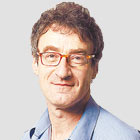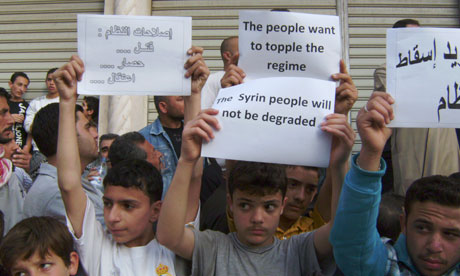Syria's president Bashar al-Assad has promised to display captured foreign "mercenaries" who have been fighting his regime and denounced western governments for failing to protest at the violence being perpetrated by his enemies.
In his first interview in many months, Assad told Russian state TV that the Syrian opposition had shown itself to be insignificant by calling for a boycott of the recent parliamentary elections – dismissed as a sham by critics in Syria and abroad.
"How can you boycott the people of whom you consider yourself the representative?" the president asked. "I don't think that they have any kind of weight or significance within Syria."
Opposition activists meanwhile reported 30 dead across the country on Wednesday. The Local Coordination Committees group said 21 had been killed in Homs, four in Daraa, two each in Damascus and Idlib and one in Deir Ezzor. In all, an estimated 10,000 people have been killed by the Assad regime over the last 15 months.
Assad also issued a veiled warning to unnamed countries he said were interfering in Syria – an apparent swipe at Saudi Arabia and Qatar, which have called for arming the rebels.
"For the leaders of these countries, it's becoming clear that this is not 'spring' but chaos. If you sow chaos in Syria you may be infected by it yourself, and they understand this perfectly well."
Syria claimed from the start of the uprising it was facing armed terrorists rather than a popular and at least initially largely peaceful uprising. But the opposition has become more militarised and violent in recent months.
Assad also mentioned religious extremists and al-Qaida members from abroad. "There are foreign mercenaries, some of them still alive," he told Rossiya-24 TV. "They are being detained and we are preparing to show them to the world."
Syria has previously mentioned a list of 12 foreign terrorists killed in Syria, including one French citizen, one British and one Belgian.
The US and other western governments say they have detected a jihadi or al-Qaida presence there. The al-Qaida leader Ayman al-Zawahiri has urged all good Muslims to fight Assad's "pernicious, cancerous regime".
Several Tunisians were recently killed in Syria and Islamist fighters from Libya are known to have made their way to the Idlib area via Turkey. Others have entered the country from neigbouring Lebanon and Iraq but in small numbers and on an ad hoc basis.
But the strong suspicion is that Assad is deliberately exaggerating the point. "The Syrians have tried to make a big thing recently about the influx of foreign fighters but the majority of serious security problems are still home-grown," said one western diplomat. "In essence this is still a Syrian problem."
The issue came up dramatically last week when twin suicide bombings killed 55 people and injured nearly 400 others near a Damascus security building – the worst attack of its kind so far. Responsibility was initially claimed by a little-known jihadi group called Jabhat al-Nusra but that claim was later withdrawn.
"The Assad regime has been quick to blame jihadi elements linked to the opposition," commented Emile Hokayem of the International Institute of Strategic Studies. "This fits neatly with the regime's attempt to ensure the loyalty of urban Sunnis and minorities fearful of Islamist rule by portraying all opposition as radical, violent and foreign-inspired."
"Just as unsurprising is the opposition's accusation that the bombings were the work of Assad's manipulative and nefarious security services. This is not entirely implausible, given their record and Assad's previous sponsorship of jihadi outfits operating in Lebanon and Iraq. However, a more likely scenario is that those jihadi outfits, which never had much in common with the Alawite Assad beyond an anti-American agenda, have simply turned against their former patron."Analysts of the 7 May elections say a vote for Assad's reforms was undermined by the participation of renamed pro-government parties, safe seats being given to loyalists and regime cronies who were described as independents. They also mention widespread irregularities and massive exaggeration of the reported 51% turnout.











